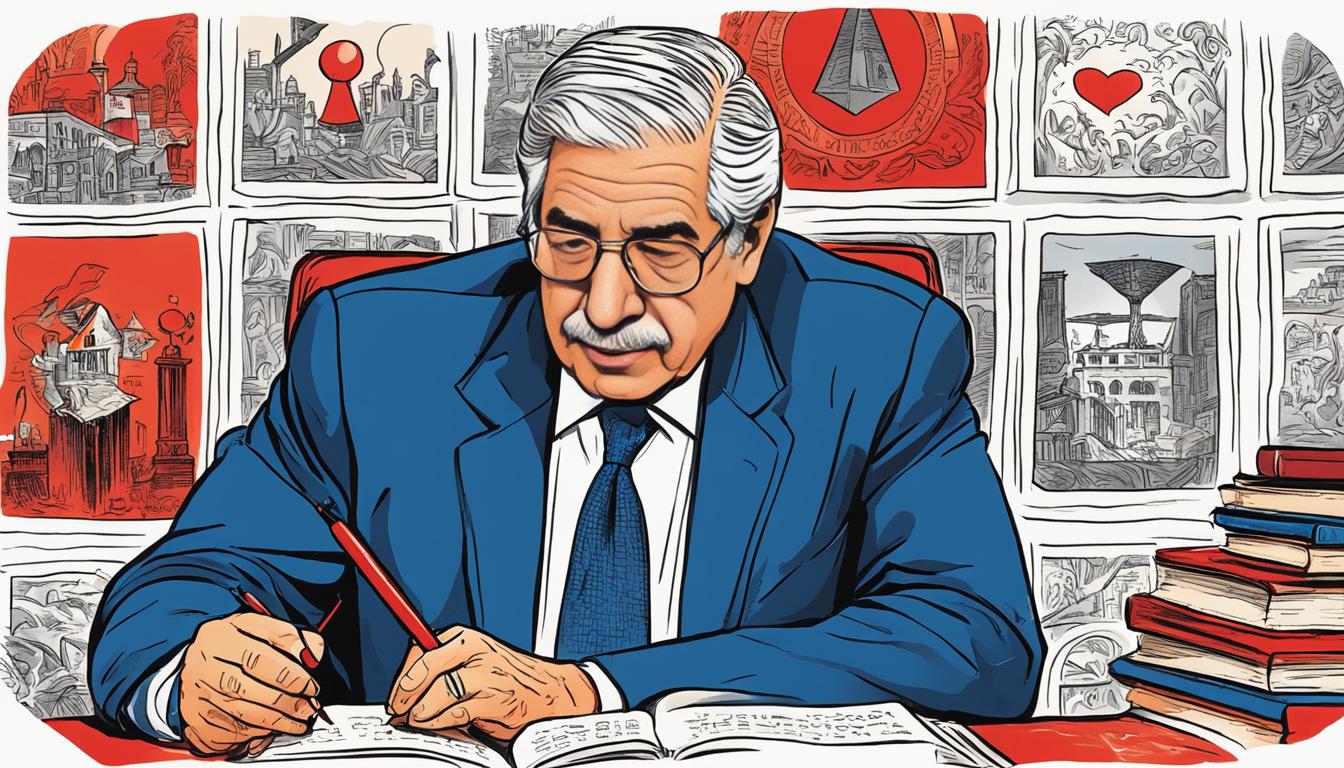If you’re looking for a thought-provoking and illuminating read, look no further than “The Language of Passion” by Mario Vargas Llosa. This compelling collection of essays provides an insightful analysis of some of the most pressing issues of our times. In this article, we will explore the key themes of the book, analyze the author’s writing style and delve into the critical reception of the work. Whether you’re a fan of Vargas Llosa’s writing or simply interested in gaining a deeper understanding of his work, this book is a must-read.
About Mario Vargas Llosa
Mario Vargas Llosa is a Peruvian-Spanish writer and politician, born in Arequipa, Peru in 1936. He is one of the most prominent Latin American writers of the 20th century and has won numerous international awards for his work, including the Nobel Prize in Literature in 2010.
Throughout his prolific career, Vargas Llosa has explored a diverse range of literary genres, including novels, essays, and plays, often tackling complex themes and ideas with a keen eye for detail and nuance.
After obtaining a degree in literature and law from the National University of San Marcos in Lima, Vargas Llosa went on to study at the Complutense University of Madrid in Spain. He has since lived and worked in various countries around the world, including Peru, France, the United States, and Spain.
Vargas Llosa’s literary achievements include his acclaimed novel, “The Time of the Hero” (1963) and “The War of the End of the World” (1984). He is known for his candid writing style, which often explores difficult and taboo subjects.
Understanding “The Language of Passion”
The Language of Passion is a collection of essays written by Mario Vargas Llosa. Throughout the book, Vargas Llosa explores various themes and ideas, offering insightful commentary on language, literature, and society.
One of the core concepts explored in the book is the power of language. Vargas Llosa argues that language is a tool for expressing emotions and desires, and that it has the power to create a sense of passion and connection between people. He also explores how language can be used to manipulate and control individuals and societies, highlighting the importance of critical thinking.
Themes Explored in “The Language of Passion”
Some of the key themes explored in the book include the relationship between language and power, the complexities of human emotion, and the role of literature in society. Vargas Llosa also delves into topics such as the impact of technology on language and communication, and the ways in which language shapes our beliefs and perceptions.
“Language is a living, breathing entity, constantly evolving and adapting to our ever-changing world.”
Analysis of “The Language of Passion”
Vargas Llosa’s analysis in The Language of Passion is thought-provoking and insightful. He draws upon his vast knowledge of literature and language to explore the complex themes and ideas presented throughout the book. Through his commentary, Vargas Llosa provides a deeper understanding of the power of language and its impact on society.
Notable Quotes from “The Language of Passion”
“Language is a living, breathing entity, constantly evolving and adapting to our ever-changing world.”
“Passion is the language of the soul.”
“Words have the power to create worlds, but also to destroy them.”
Key Essays in “The Language of Passion”
One of the standout features of “The Language of Passion” is its collection of insightful essays that delve into a wide variety of themes and topics. Vargas Llosa’s commentary offers readers a unique perspective on literature, society, and politics.
| Essay Title | Key Themes |
|---|---|
| The Culture of Liberty | Freedom, individualism, democracy |
| The Literature of Industry | Industrialization, modernization, cultural identity |
| The Temptation of the Impossible: Victor Hugo and “Les Misérables” | Social justice, revolution, humanism |
| The Inca Garcilaso and Contemporary Peruvian Literature | Cultural heritage, colonialism, postcolonialism |
| Literature and Politics in the Americas | Pan-Americanism, nationalism, democracy |
The Culture of Liberty is one of the key essays in the collection, offering a thought-provoking analysis of the role of individualism and democracy in society. In this essay, Vargas Llosa argues that freedom is essential to human flourishing and that democratic societies must learn to tolerate dissent and allow for diversity of opinion.
The Literature of Industry is another standout essay that explores the relationship between literature and industrialization. Vargas Llosa examines the ways in which industry and modernization have influenced cultural identity and the creation of literature.
The other essays in “The Language of Passion” are equally engaging and informative. They cover a range of topics, from social justice and revolution to cultural heritage and postcolonialism. Vargas Llosa’s commentary offers readers a fresh perspective on these themes, challenging us to think deeply about the world around us.

Exploring Vargas Llosa’s Writing Style
One of the most intriguing aspects of “The Language of Passion” is Vargas Llosa’s unique writing style, which employs a combination of eloquence, creativity, and precision. His writing is characterized by a distinct clarity of expression, allowing readers to easily understand and appreciate his ideas.
Throughout the book, Vargas Llosa employs a range of rhetorical devices, such as metaphor, allusion, and hyperbole, to add depth and complexity to his writing. His use of language is particularly effective in conveying the emotional power of his ideas, which are often rooted in personal experience and observation.
Vargas Llosa’s prose is like a finely-crafted windowpane through which readers can view the world in a new and insightful way. His writing style is a testament to his skill as a masterful wordsmith, and it adds immeasurably to the overall reading experience of “The Language of Passion.”
Critical Reception and Impact
Since its publication, “The Language of Passion” has received widespread critical acclaim. The collection of essays has been praised for its depth, scope, and insightful commentary on various topics.
According to Publishers Weekly, “Vargas Llosa’s insightful commentary invites readers to reconsider some of the pressing issues of our time.” Similarly, The New York Times Book Review hailed the book as a “thought-provoking and well-written collection of essays.”
The impact of “The Language of Passion” extends beyond its critical reception, as it has also influenced readers and the literary community. The book’s thought-provoking commentary has sparked meaningful conversations and debates, inspiring readers to explore deeper layers of meaning in literature and society.
“The Language of Passion” is a remarkable book that offers a unique and insightful perspective on a range of issues. Vargas Llosa’s thoughtful commentary and engaging writing style make it a must-read for anyone interested in literature, culture, and society.”
To date, “The Language of Passion” continues to inspire and provoke thoughtful analysis, cementing its place as a timeless collection of essays by Mario Vargas Llosa.
Themes Explored in “The Language of Passion”
Throughout “The Language of Passion,” Vargas Llosa explores a range of themes that delve into the complexities of human existence, particularly when it comes to the realm of love and desire. These themes are examined through the lens of literature and art, offering readers a unique perspective on the ways in which the human experience is shaped and defined by the creative works that we produce.
The Nature of Desire
One of the key themes explored in “The Language of Passion” is the nature of desire, particularly within the realm of romantic relationships. Throughout the book, Vargas Llosa unpacks the various ways in which desire operates within our lives and how it can be simultaneously transformative and destructive.
The Power of Language
Another central theme in “The Language of Passion” is the power of language and its ability to shape our experiences of the world. Vargas Llosa explores the various ways in which language can be used to express desires and emotions that are otherwise unarticulated, drawing connections between language and the act of creation itself.
The Intersection of Literature and Life
Finally, “The Language of Passion” delves into the intersection of literature and life, exploring the ways in which our experiences of the world are often co-constructed through the stories we consume and the art we create. Vargas Llosa’s insightful commentary challenges readers to think more deeply about the role that literature and art play in shaping our lives and the world we live in.

Notable Quotes from “The Language of Passion”
As a collection of insightful essays, “The Language of Passion” by Mario Vargas Llosa is replete with memorable lines and powerful commentary. Here are some of the most notable quotes:
“A good novel is a dialogue between the writer and the reader, each one taking turns to imagine, dream, and create.”
“Literature is the mother tongue of humankind. It is the language we use to express our deepest fears, desires, and aspirations.”
“The act of reading is an act of empathy. It allows us to inhabit the lives of others, to experience their joys and sorrows, and to expand our own horizons.”
These quotes illustrate Vargas Llosa’s profound insights into the power and importance of storytelling, as well as his ability to convey deep emotions and universal truths through his writing.
Indeed, “The Language of Passion” is a book that both inspires and challenges readers to see the world in new ways, and these memorable lines serve as a testament to the enduring power of Vargas Llosa’s words.
Impact and Legacy of “The Language of Passion”
Since its publication, “The Language of Passion” has had a profound impact on literature, cementing Mario Vargas Llosa’s reputation as one of the most insightful essayists of our time. The book’s exploration of love, politics, literature, and culture has captivated readers worldwide, inspiring thoughtful contemplation and spirited debate.
Vargas Llosa’s work has had a lasting legacy, informing the literary canon and influencing the works of countless modern authors. “The Language of Passion” stands as a testament to his unique perspective and unwavering dedication to the written word.
“Mario Vargas Llosa’s essays are a treasure trove of expert analysis and thought-provoking insights. The impact of ‘The Language of Passion’ will undoubtedly be felt for generations, as it continues to inform and inspire readers of all ages.”
Conclusion
In conclusion, “The Language of Passion” by Mario Vargas Llosa is a thought-provoking and insightful collection of essays that explores a wide range of themes and ideas. Throughout the book, Vargas Llosa’s unique writing style enhances the reading experience, offering readers profound insights into the human condition.
By analyzing the themes explored in the book and highlighting some of Vargas Llosa’s most memorable quotes, we have been able to gain a deeper understanding and appreciation of “The Language of Passion.” Furthermore, by examining the critical reception and impact of the book, we can see the lasting legacy it has left on literature and Vargas Llosa’s body of work.
Overall, we highly recommend “The Language of Passion” to anyone looking for a compelling and insightful read. This book is a true masterpiece and a testament to Vargas Llosa’s literary genius.



